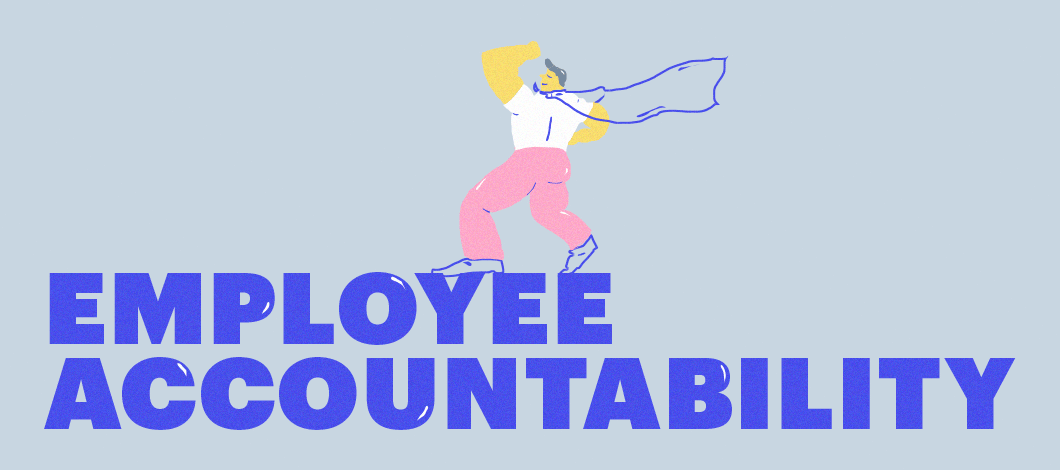Like parts in a machine that work together, every team member’s contribution matters.
As such, each employee should be accountable for the role they play in achieving the outcome everyone is working toward. When employees aren’t held accountable, they can start to fall short of their potential.
What Is Accountability?
Accountability in the workplace points to the employees’ willingness to account for their own actions when they’re being watched and when they are n’t. Real accountability should feel natural in a team dynamic. However, it’s only possible when team members know their own interests are aligned with the team’s.
What Makes Accountability Possible?
Only job satisfaction gives employees a natural sense of obligation to account for their work, so optimizing for employee retention and boosting team morale are places to start.
To build a trusting business relationship, executive leaders should give their employees helpful feedback and opportunities for growth in their careers. It also is important to connect company goals and aims with your employees’ own goals to truly stay in touch.
Why Employees Lose Steam
Every manager has at one point or another seen an employee fail to invest the effort required to succeed to their highest capability. Employees lose motivation for various reasons, whether they’re experiencing disruptive emotions, don’t connect personally with the company enough to care or they don’t think their work matters.
All people have motivations, of course. The key is aligning employee motivations with those of your company. When employees feel they don’t have a say or a degree of autonomy in their roles, they won’t capitalize on their talents to deliver high-quality work.
What Happens Without Accountability?
Despite being an abstract concept, accountability has a tangible impact on your bottom line. Major accountability issues in the workplace that arise include:
Slower Productivity
If employees aren’t held accountable for their time and performance, they could become comfortable in their autonomy and productivity can slow. Without feeling like they’re seen, they might take longer breaks or walk into work late once or twice a week.
If employees fall behind on serious deadlines, it could reflect poorly to your investors.
Lower Quality Work
If employees aren’t held accountable for their actions, they may lose sight of the value their work creates for the company and stop putting in quality, careful work. It can potentially have serious consequences on your business.
For example, if an employee makes a vital error that affects your brand’s image, it can directly affect your bottom line.

Balancing Accountability With Autonomy
A huge cause of low productivity and employee dissatisfaction is micromanagement. According to a 2017 study from the University of Birmingham, employees granted more autonomy enjoy healthier work environments and higher job satisfaction. Giving your staff the freedom to manage their own time establishes trust and can boost morale. When employees don’t wait to do what they’re told they can “show” instead of “tell” and their performance is easier to hold accountable.
Incorporate opportunities for social engagement that make accountability easy and natural. Events and perks that celebrate performance cause employees to focus on their tangible contributions.
How to Encourage Employee Accountability
The key is to incorporate strategies that incentivize accountability, such as rewarding initiative, providing helpful feedback and providing opportunities for leadership.
1. Connect Your Team With the Right Technology
The closer your workers are connected digitally, the better they can strike the right balance between autonomy and accountability. Collaboration tools such as Trello and Monday make it easy for employees to keep their teams updated on their tasks and progress, and messaging apps such as Flock allow them to communicate securely on the cloud. If your team works virtually, face-to-face communication is all the more crucial.
Make sure employees have video conferencing software such as Zoom, Zoho Meeting or GoToMeeting, as well as hardware like webcams and headsets. Set an example for employees to stay in touch and check in for casual updates.
2. Sit Down With Employees to Provide Individual Feedback
Providing employees with feedback is a practice that can get blurred in practice and become a form of micromanaging. Employees can easily become anxious or nervous when they’re expected to report or discuss their own short-term performance to a superior.
To raise accountability without hovering over employees, make the focus of performance feedback about the individual employee instead of about the company.
Take the time to provide feedback to employees in a way that shows them you care about their long-term goals. Why should employees care about the company’s goals when the company doesn’t care about theirs? Don’t just focus on their measurable performance, such as sales numbers, but discuss each employee’s skills development. The only way you can do this is by sitting down one on one with each employee, building a relationship that can support accountability.
3. Reward Initiative With Recognition and Acknowledgement
In establishing a culture of accountability, employees need to know their work is being seen by their co-workers.
Thank-you notes are a great way to recognize individual efforts. Meanwhile, taking your staff out to lunch and planning out milestone celebrations are some ways you can hold employees accountable. With the milestone celebration to look forward to, employees are more apt to tracking their own performance and holding themselves accountable.
Sharpen a competitive edge among your team now and again by upping the stakes. Hold competitions that reward top performers with gift cards or other small perks. These competitions aren’t just to incentivize higher performance, but to get your workers tracking their own performance and holding themselves accountable.
4. Delegate Leadership Roles at Meetings
Meetings and conference calls are where everyone’s held accountable to one another simply by having to show up. Up the stakes a little by assigning employees leadership roles at staff meetings.
Delegating leadership roles in this way helps foster accountability at work by requiring employees to go beyond their typical responsibilities and hold others accountable. With delegated leadership roles in meetings, for example, employees are more motivated to account for their actions to their peers. As leadership roles switch out for everyone to have a turn, this practice fosters a mindset of mutual accountability in the workplace.
Provide feedback to employees who take on the assigned leadership roles to help them improve their soft skills and work toward their career goals. Providing helpful, constructive criticism shows employees you’re holding them accountable to your own goals and not just to meeting company needs.
5. Share the Company’s Vision and Goals
In addition to the goals that individual teams set and work toward, be sure to connect employees back to the company’s top-down vision. Update them on the company’s progress in meetings and recognize successes that occur at all levels of the company, not just within each department. Goals inform employees of what’s expected of them and help individuals align around outcomes instead of tasks. Make goals a topic at the beginning of every meeting or conference call.
A great company vision ties into a human goal everyone can understand or relate to. For example, Netflix’s vision statement is to “entertain the world.” In the spirit of the company vision, Netflix could focus on generating entertainment value within team meetings so that everyone enjoys them.
By holding employees accountable for upholding the company vision to their own end, you give them something beyond a paycheck to work toward. In effect, it fosters a work culture in which employee interactions are more transparent because everyone feels the weight of each contribution to the workplace environment.
6. Optimize Your Employee Retention Strategy
Retention strategies help companies secure employees who stay on longer because they truly want to. Employees you retain have knowledge and experience that can help them take on leadership roles. Veteran employees demonstrate why accountability matters, because they show others the benefits of staying with the company. Incentivize your staff to keep their positions with a solid benefits package, free training and opportunities for promotion.
When you optimize for employee retention, you’re also improving their satisfaction and building a foundation trust. When employees trust that you care, they can naturally feel open to being held accountable without it feeling overbearing.
Fostering an Accountability Culture in Your Workforce
Sometimes team members fall short of expectations because they have a skills gap, but more often there’s a problem of accountability.
When employees are held accountable for outcomes, they’re more careful and attentive to the work they put in. When they know their own common interests are in the company’s mind, employees are transparent, communicative and responsible with their work efforts.











